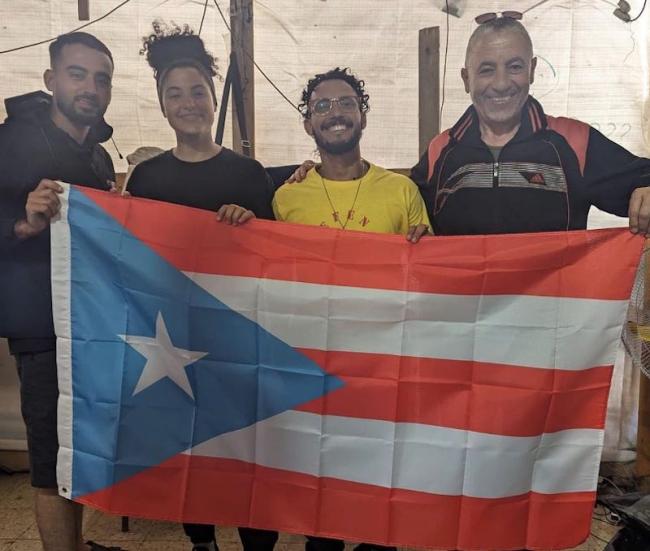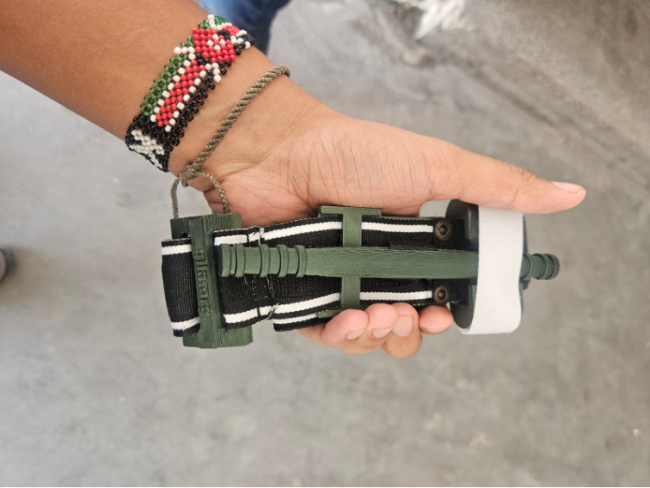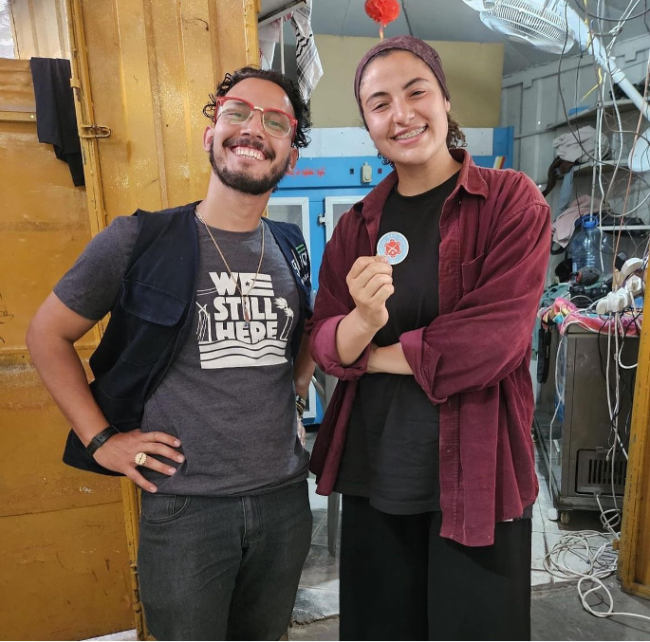
This interview was originally published in Spanish by 9 Milliones. Leer este artículo en español.
Libre Sankara, a Boricua aid worker, entered Gaza on May 1 carrying multiple suitcases filled with medical equipment, food, and water to help Palestinians who have been injured and displaced by Israel’s ongoing military invasion. Since crossing the Egyptian border at Rafah, in the south of Gaza, they could hear the sound of explosions and felt the violent shaking of the building where they offered aid. Afterwards, Sankara saw the devastation inflicted on Rafah, a city whose population has, at least, quadrupled due to the number of Palestinians displaced from regions that have been decimated by bombings.
Sankara, who has also protested for Puerto Rican independence, said they could not just sit around and watch the devastation without doing something. They travelled to Gaza with the Canadian medical organization Glia to work as a logistics coordinator for the medical missions that the group has been organizing since February. Sankara was interviewed on May 7, the day after Israel started its invasion of Rafah. Since then, Sankara and their colleagues have had to evacuate their housing twice because the bombings were getting closer. Now, they have moved closer to the middle of Gaza.
Tal-Al Sultan Primary Health, one of the first hospitals Sankara visited, no longer functions as a medical center; it was turned into a morgue after the continuous bombing and massacre of a nearby refugee camp. Meanwhile, Al-Helal Al-Emirati—the only maternity hospital in Rafah—had to evacuate all the babies in its care to an outdoor field hospital, fearing that the invasion would reach them, according to Sankara. Eighty percent of medical centers in Gaza are no longer functioning as of early May, according to the Gazan Health Ministry.
After the Hamas attack on Oct. 7, 2023—which killed more than 1,000 Israelis—the Israeli military has killed more than 36,000 Palestinians in Gaza in an invasion that international experts have categorized as a genocide. However, the origins of this genocide date back to the foundation of the State of Israel in 1948, when 750,000 Palestinians were displaced from their homes in an event known to Palestinians as the “Nakba,” or catastrophe.
In early May, Israel took control of the Rafah crossing along the border with Egypt, closing a vital access point for bringing food and medical resources to help people on the verge of starvation. On May 6 Israel issued an evacuation order for Rafah ahead of a ground invasion, causing 900,000 Palestinians to migrate out of the city, according to the Israeli military, to crowded refugee camps and areas already devastated by war.
“People are taking their houses on their backs,” Sankara said. “They only have their memories and what they have been able to take with them.”
With the border closed, medical resources cannot reach people in need of treatment. The United Nations has announced it will no longer be able to distribute food in Rafah due to a lack of resources and security. Another Glia medical delegation has been trying to enter Gaza since May 13, but they have continuously been denied entry. Israel and Egypt have blamed each other for the ongoing border closure, which has prevented humanitarian aid from crossing into Gaza.
In this interview, Sankara speaks at length about the lack of medical resources in Gaza, the invasion of Rafah, the scarce security in hospitals during the invasion, and the similarities between Palestine and Puerto Rico. The conversation has been edited for length and clarity.
Carlos Berríos Polanco: Could you tell me about the lack of doctors and medicine? How is that affecting the population of Gaza?
Libre Sankara: We have to take into account, for the people that do not know, there are many people displaced in their own territory. I have talked with many Palestinians who have moved three times or more—[as many as] five times—because of the evacuation orders in the northern areas. Supposedly, the south was going to be the better [place], and from there they could leave or have a little bit more security; but that was a lie because, right now, since yesterday [May 6], they started invading. They [issued] a new evacuation order for the only emergency and trauma hospital in this area. So, [that] means they are asking for people to move north to a part of Gaza called Khan Younis—that lies in the middle—but that was after bombing and destroying it.
They will return to nothing. Absolutely nothing.
Right now, they are there on the beach, in their tents, because there is not enough housing. Before the invasion and the genocide here in Gaza, in Rafah specifically, there were about 200,000 people. But now, there are more than a million people in a very small area. So, it is super hard. It also means the majority of medics and nurses are from the north, from hospitals that have already been destroyed. In Al-Shifa, they [Israel] have literally destroyed the largest hospital in that area. So, what happens? We have less and less safe spaces for people and less and less resources.
The only safe way we were bringing in resources was through the border, which is called the Rafah Crossing. Now, after yesterday [May 6], according to the warnings, they are not letting anything come through there either. There are other borders, but they are not safe. We do not know if [resources] will come through, if we do not bring them ourselves. I came in with a lot of luggage. I went to the clinic and left everything I had. That is the safest and best way to bring things in here, especially, when you are talking about things that have to do with medicine. There is a lack of vaccines. There is an epidemic of Hepatitis A. There is malnutrition, and there are people suffering through things that can be avoided if this genocide stops and people have the time, space, and security to reconstruct their land.

CBP: Since the invasion of Rafah by Israel, are you, your patients, and the people in the hospital where you’re located safe?
LS: We have the right and duty to help this population that needs the services we’re offering. Taking that into account, I won’t lie, my nerves are through the roof. In the morning, at 4:30 am, the house was shaking because a bomb exploded very near.
Literally, every person here has lost something, someone or multiple people. It is really hard, not only to work under these conditions, but to believe that people want to keep moving whenever the Israelis want. It is not so easy. Imagine having to move five times. Not to [a place] under a roof, but anywhere. Without access to drinkable water. Without access to food. It’s a mess.
Speaking of medics and nurses, unfortunately, taking into account what happened yesterday [May 6], all the bombings and the evacuation order, [they] are going to the north to avoid the invasion reaching them. It is really sad because we need more medics… What they are doing, within the [refugee] camps where they are living, is creating mobile hospitals where they are trying to use resources, trying to use the few vaccines here and treating people that need attention.
We are talking about people who are resilient, but saying that people are resilient does not mean that they need to keep testing how much more they can take. These people have suffered a ton. They have the right—in their own country—to feel safe and not live under genocidal conditions. Hospitals, now, need to be a safe place, but they are the points Zionists are attacking first.
CBP: Do you think hospitals are a target for the Israeli military?
LS: They are attacking hospitals first, then schools, places that are allegedly protected. International law does not belong to Zionists; there is a double standard.
As foreigners, as people from the outside, we are secure. Being in these places, it makes them safer. It does not mean nothing will happen, but it is less possible because there is an audience that is witnessing this genocide and what is happening. We, as a strategic tactic, are thinking about staying in these hospitals to at least give them a little bit more protection and security. We are talking about women who want to give birth in a safe place. Under these conditions, it is difficult and severe.
If they enter one of the hospitals, called Emirati—which is in Rafah—right now, 50 kids will die. The doctors and nurses who remain will die. Literally, I’m not exaggerating. We have already seen the mass graves in the north, right outside the hospital. It is not something made up. It is not my imagination.

CBP: That point you mentioned—that the people of Gaza are resilient but they should not prove how much—we know that well as Boricuas. As an activist for the independence and liberation for Puerto Rico, how is the Palestinian struggle related with decolonization for Puerto Rico?
LS: I come from the oldest colony in the world. We understand that it is not easy living under these colonial conditions. We have lived and survived through genocide. Our struggle is the same. We have the same enemy: the Yankee Empire, because the Zionists receive funding from the United States to commit this genocide.
I am here talking about our country with Palestinians. They [tell me], “I did not know that about Puerto Rico. That sounds like Palestine.” And that is true. The bombs they [Israel] have been using here were [tested] in Vieques. The weapons they have been using were probably [tested] in Vieques. There is a direct connection with our struggle.
Every morning, when I leave where we are staying, there are kids that greet us. They say, “hey, hey, how are you?” They shouldn’t live [like this]. They should not have to see what is happening. They should not live under these conditions; they have a long-term effect. It has an effect on the next generation. For me, it is really sad. But we can do something because solidarity is not just a word: it is an action. I’m here practicing solidarity with action. That is super important because we need to take into account that our liberation and our independence stands with oppressed people, not separate from the rest of the world.
CBP: How did you make the decision to go to Palestine?
LS: We take this risk and it’s real, but we cannot think only about ourselves, if not as well about the long term effects. Imagine if the same thing was happening in Puerto Rico. I [would want] people to [come] from other places [to help us] because it helps us carry that emotion together. When we do that together—united—it is easier.
We need to be here. More people need to come here—if they are let in. I’m not saying that it is easy, and I am not saying that everybody should come here, but the people who want to and have the medical experience, they should come. The ones who cannot come, they [can] amplify what is happening, stage protests, form encampments, send resources. Either way, everybody has a role.
You can watch the full interview with Sankara here. Learn more about Glia's work and how to help here.
Carlos Berríos Polanco is a multimedia journalist from Caguas, Puerto Rico. He specializes in covering climate, conflict, and the intersection of the two.

